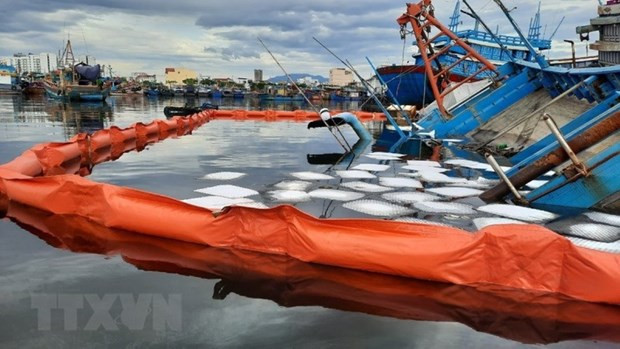 Containing an oil spill from a capsized fishing ship at Tho Quang Fishery Port in Da Nang city (Source: VNA)
Containing an oil spill from a capsized fishing ship at Tho Quang Fishery Port in Da Nang city (Source: VNA)Hanoi (VNA) – Thanks to the serious implementation of social distancing to curb the spread of COVID-19, some sea areas have recorded improvements such as the appearance of a pink dolphin off the coast of Do Son district, northern Hai Phong city. However, the maritime environment is still facing numerous risks and environmental incidents due to the pandemic, especially risks of oil spills.
Numerous risks present
At an August 25 webinar on environmental protection amid the COVID-19 pandemic, Nguyen Chu Hoi, member of the Standing Committee of the Vietnam Association for Conservation of Nature and Environment and deputy of the 15th-tenure National Assembly, said the pandemic has caused considerable impact on all socio-economic activities, and environmental issues are always linked with the life and development.
There are a number of risks to the maritime environment because the sea is a trans-boundary factor and affected by climate change, which has been strongly impacting seas, islands, and coastal zones in the long term as seen in the warming of ocean water, ocean acidification, ocean deoxygenation, the degradation of ecosystems, and the increase of coastal erosion.
In addition, many dumping grounds for plastic waste in coastal and insular areas, along with waste flowing from the mainland through rivers, are threatening and “poisoning” oceans. This will greatly affect the maritime environment, leading to a decline in marine species, particularly coral, according to Hoi.
Echoing the view, Pham Van Son, Director of the Vietnam Environmental Incident Response Centre (SOS Centre), pointed out that the COVID-19 pandemic has hampered the examination of the compliance with environmental protection rules; the verification, approval, and implementation of incident response plans; along with response training and drills.
Since mid-2020, petrol and oil prices have fallen as a result of the pandemic’s impact, which has encouraged fishermen to use every possible instrument to store oil. Notably, docks have become mobile oil warehouses, posing considerable risks of oil spills, he noted.
Facing that fact, the SOS Centre has conducted examination and issued warnings for the ports where its force is present so as to prevent oil spills at sea, Son added.
Taking more proactive actions
Given the abovementioned risks, Son said to respond to environmental incidents nationwide in a timely manner, apart from the hotline of 18006558, his centre is developing an incident reporting app for mobile phones. Thanks to this app, it can quickly locate the sites of incidents, particularly on rivers, seas, and in industrial parks, so as to send response personnel.
Hoi, who is also former Deputy General Director of the Vietnam Administration of Seas and Islands, held that to ensure united resources for marine environment protection, it is necessary to connect with marine scientists to have timely warnings.
With regard to the settlement of oil spills, he recommended the enhancement of “four on the spot” (forces on the spot, command on the spot, equipment on the spot, and logistics on the spot) and “three ready’ (ready to prevent, ready to opportunely respond, and ready to settle in a prompt and effective manner) so as to deal with incidents.
Besides, the State should decentralise power more strongly in terms of protecting the maritime, coastal, and insular environment; step up high-tech application and co-management to marine resources and environment; and strictly controlling waste sources from the mainland.
The COVID-19 pandemic has caused difficulties for the economy and people’s life, but attention should be paid to not only the twin targets but also environmental protection, Hoi said./.






























